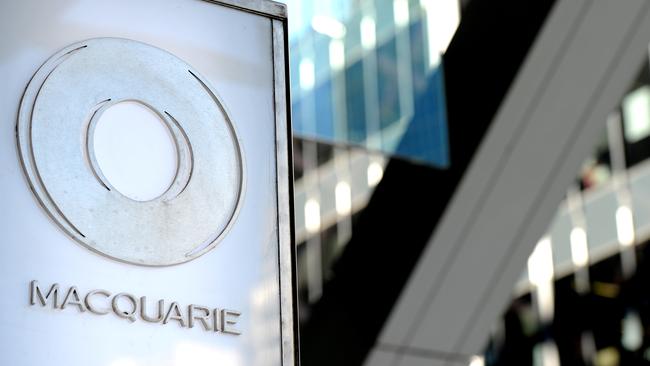
Fresh from its well-timed $1.5bn capital raising, investment bank Macquarie Group and its associated family of Europe-focused funds are preparing to spend up big on Britain’s ageing infrastructure, and politicians looking for good-news distractions are happy to sign up.
The opportunistic move in the UK comes as another Macquarie-sponsored fund is reportedly raising $US7bn ($9.9bn) to spend on infrastructure in the US, with an eye to capitalising on President Joe Biden’s $US2 trillion infrastructure plan. A spokesman for Macquarie declined to comment.
The figures are big and they reconfirm that Macquarie under chief executive Shemara Wikramanayake is busier outside Australia than in, as it gets back to its classic operating model of raising cash from big institutions and pension funds and setting it aside for infrastructure investment.
The UK commitment, which is expected to be outlined in coming weeks, could see Macquarie giving much-needed private sector momentum to Johnson’s centrepiece £650bn ($1.2 trillion) “levelling up” infrastructure investment plan that was launched last September.
Macquarie’s involvement in the UK goes back decades, including previous ownership of Britain’s biggest water supplier Thames Water. It also owns a string of regional airports, including Glasgow, which got a boost from the thousands of delegates attending last year’s COP26 environmental conference.

Like everything with Macquarie, timing is important.
Its big bet on infrastructure comes at an important part of the economic cycle, with rising interest rates and inflation.
The nature of the infrastructure assets, from pipelines and roads to ports – stable, long-life, largely resistant to economic slowdowns – makes them more attractive in rising interest rate markets than equities.
Infrastructure is particularly resilient to rising inflation as the nature of the assets means that higher costs can quickly be passed through to end users.
Indeed, most major infrastructure assets have explicit inflation clauses in their contracts or government concessions.
Infrastructure will take centre stage on Tuesday as Wikramanayake oversees her fourth operational update as chief executive of the $74bn bank.
Adding momentum, the update will also narrow in on Macquarie’s European business, where it has more than $115bn in funds under management, mostly in the Macquarie European Infrastructure Fund, and just over 2400 staff.
Despite the recent sharemarket volatility, Macquarie is expected to push ahead with a third-quarter earnings update at Tuesday’s briefing, including an outlook for its full-year profit when it signs off on its accounts at the end of March.
Indeed, the volatility, particularly around oil and gas, is set to play into Macquarie’s trading strengths during the December quarter.
This will highlight one of the contradictions around Macquarie: while it talks a big green game in terms of renewable investments, its biggest business unit today – commodities and global markets – is among its dirtiest.
Macquarie is a major player in North American gas trading and storage markets. It is also a significant trader globally in physical oil markets and owns infrastructure in carbon-related industries.
Green race
Macquarie rarely stands still and the massive wave of global investment funds aimed at renewables mean that its green bets will dominate every part of the investment bank in years to come.
When Wikramanayake took over Macquarie in November 2018 she doubled down on the bank’s investment in green energy and took it even more global. This came on the back of her predecessor Nicholas Moore signing off on the landmark acquisition of the Green Investment Group from the UK government for nearly $4bn a year earlier.
This was to give Macquarie a platform to push into renewable energy markets in Europe, but has also been leveraged for infrastructure around the world, including in Australia.
The Green Investment Bank is now one of the biggest renewable energy investors in the world and the stars have aligned, putting Macquarie at the centre of the investment boom which is expected to run into trillions of dollars over coming decades.
Wikramanayake was one of just a handful of Australian CEOs who attended last year’s UN COP26 climate change conference. Indeed the CEO led a business delegation and took part in a number of sessions during the two-week Glasgow conference. (One of Macquarie’s top funds executives, Peter Duranate, outlined the challenges of driving across Europe in an electric vehicle, including the need for more charging stations).

Wikramanayake also met senior Scottish MPs and powerful global bankers looking for green investment opportunities, including Jane Fraser, CEO of US giant Citi; Alison Rose, the CEO of the UK’s NatWest; and Anne Richards, the CEO of Fidelity, one of the biggest fund managers.
During the conference the Macquarie boss sat on a panel with former Bank of England governor Mark Carney to highlight the need to get climate financing into emerging and developing economies.
In its latest accounts, lodged shortly before Christmas, the Green Investment Group was sitting on directly owned net assets of £369m with investments across Italy, Spain, the UK, France and Poland. However this only gives a partial picture, with much of the investments in specialised funds.
The Green Investment Group last year committed or helped finance more than £1bn worth of projects around the world. It now has over 30GW in renewables capacity under development across more than 240 projects around the world. To put this in perspective, Australia’s east coast energy market has around 55GW of generation capacity.
Among local projects, the Green Investment Group is undertaking a feasibility study into the development of a green hydrogen hub at Newcastle Port.
And while the group was designed to be a passport to Europe, Brexit has since complicated the UK’s relationship around financing.
The Green Investment Group said despite agreement between the EU and the UK on trade and co-operation, “a number of matters remain uncertain”.
“The company continues to assess the possible impacts of Brexit and its strategic options to mitigate those impacts,” it noted in the accounts.
Brokerage JPMorgan noted the run of results from Wall Street investment banks have weighed on Macquarie’s share price in recent weeks. This, and a turn in market sentiment, particularly around wage inflation across the sector, has seen Macquarie’s shares pull back from the record of nearly $216 a share seen at the start of January. However, a better-than-expected earnings update on Tuesday, likely also helped from investment banking income and funds management, will see the shares push back to $200-plus levels. Macquarie closed at $192.34 on Friday.
Around 70 per cent of Macquarie’s earnings are now from outside of Australia and this figure is likely to rise sharply in coming years as the bank takes advantage of US and British infrastructure spending.
While industry funds have been more active in Australia on infrastructure – including battling it out for former Macquarie-owned Sydney Airport – Macquarie has given itself the world to play in.
johnstone@theaustralian.com.au





Embattled UK Prime Minister Boris Johnson is about to be thrown a lifeline of up to $20bn from an unlikely Australian source. It’s up to him if he wants to run with it.